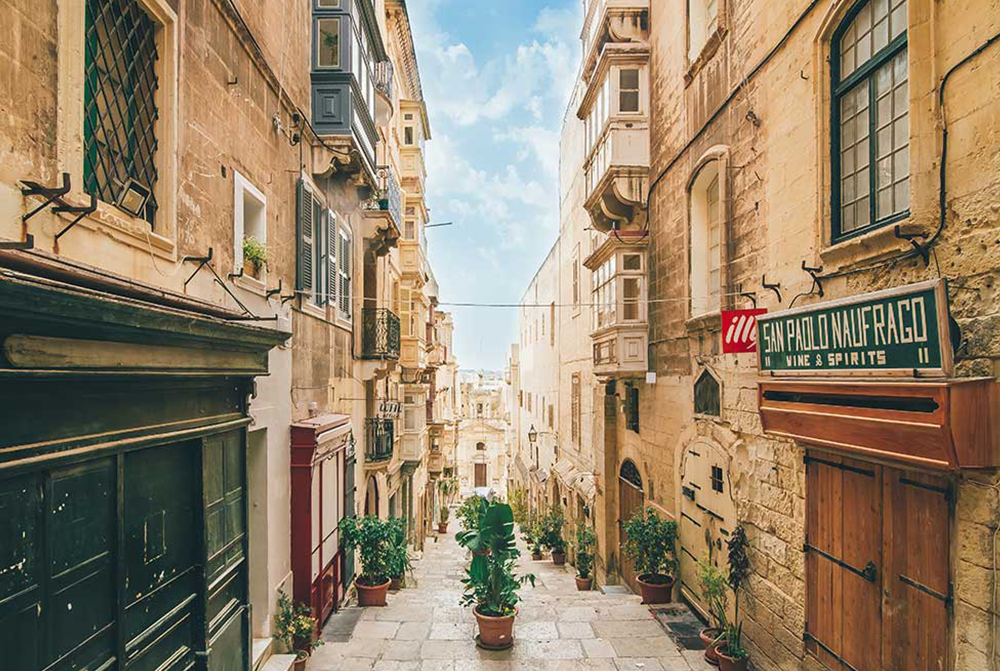Background
Malta offers a variety of routes to residency. Some are appropriate for non-EU individuals while others provide an incentive for EU residents to move to Malta.
The residence options and the tax benefits they can provide for individuals, where relevant, are detailed below.
- Malta Permanent Residence
Malta Permanent Residence is available to non-EU individuals and enables them to reside indefinitely in Malta.
Successful applicants receive Permanent Maltese residence immediately and a 5 year residence card. The card is renewed every 5 years if the requirements are still being met. There are two options with regards to this route:
Option 1: Rent a property and pay the full contribution:
- Pay the €40,000 non-refundable administrative fee; AND
- Rent a property with a minimum of €12,000 per year (€10,000 if the property is situated in Gozo or the south of Malta); AND,
- Pay the full Government contribution of €58,000; AND
- Make a donation of €2,000 to a local philanthropic, cultural, scientific, artistic, sport or animal welfare NGO registered with the Commissioner of Voluntary Organisations.
Option 2: Purchase a property and pay a reduced contribution:
- Pay the €40,000 non-refundable administrative fee; AND
- Purchase a property with a minimum value of €350,000 (€300,000 if the property is situated in Gozo or the south of Malta); AND,
- Pay the reduced Government contribution of €28,000; AND
- Make a donation of €2,000 to a local philanthropic, cultural, scientific, artistic, sport or animal welfare NGO registered with the Commissioner of Voluntary Organisations.
It is possible to include up to 4 generations in one application if it can be proven that the additional applicants are principally dependant on the main applicant.
An additional Government Contribution of €7,500 is required for each additional adult dependant (excluding the spouse) included in the application.
Applicants must show capital assets of not less than €500,000, out of which a minimum of €150,000 must be financial assets.
- Global Residence Programme
The Global Residence Programme entitles non-EU nationals to obtain a special Malta Tax Status and Maltese residence permit through a minimum investment in property in Malta.
Successful applicants can relocate to Malta if they choose to do so. They also have the right to travel to any country within the Schengen Zone of countries without the need for an additional visa(s). There is no minimum day stay requirement, however successful applicants may not reside in any other jurisdiction for more than 183 days per year.
To qualify, an individual must purchase property costing a minimum of €275,000 or pay a minimum of €9,600 per annum in rent. If the property is in Gozo or the south of Malta the minimum property value is €250,000 or €220,000 respectively, or a minimum rent payment of €8,750 per annum is required. In addition, an applicant must not spend more than 183 days in any other jurisdiction in any single calendar year.
- Tax Advantages Available to Individuals – Global Residence Programme
A flat rate of 15% tax is charged on foreign income remitted to Malta, with a minimum amount of €15,000 tax payable per annum (income arising in Malta is taxed at a flat rate of 35%). This applies to income from the applicant, his/her spouse and any dependants jointly.
Foreign source income not remitted to Malta is not taxed in Malta.
Individuals may also be able to claim double taxation relief under the regime.
- The Malta Residence Programme
The Malta Residence Programme entitles EU nationals to obtain a special Malta Tax Status and Maltese residence permit through a minimum investment in property in Malta.
To qualify for the scheme an individual must purchase property costing a minimum of €275,000 or pay a minimum of €9,600 per annum in rent. If the property is in Gozo or the south of Malta the minimum property value is €250,000 or €220,000 respectively, or a minimum rent payment of €8,750 per annum is required. In addition, an applicant must not spend more than 183 days in any other jurisdiction in any single calendar year.
There is no minimum day stay requirement, however successful applicants may not reside in any other jurisdiction for more than 183 days per year.
- Tax Advantages Available to Individuals –The Malta Residence Programme
A flat rate of 15% tax is charged on foreign income remitted to Malta, with a minimum amount of €15,000 tax payable per annum (income arising in Malta is taxed at a flat rate of 35%). This applies to income from the applicant, his/her spouse and any dependants jointly.
Foreign source income not remitted to Malta is not taxed in Malta.
Individuals may also be able to claim double taxation relief under this route.
- Highly Qualified Persons Programme
The Highly Qualified Persons Programme is directed towards professional individuals earning over €86,938 per annum (basis year 2021), employed in Malta on a contractual basis.
This route is open to EU nationals for 5 years (may be extended 2 times – 15 years in total) and to non-EU nationals for 4 years (may be extended 2 times – 12 years in total. A list of qualifying positions is available on request.
- Tax Advantages Available to Individuals – Highly Qualified Persons Programme
Income tax is set at a flat rate of 15% for qualifying individuals (instead of paying income tax on an ascending scale with a current maximum top rate of 35%).
No tax is payable on income earned over €5,000,000 relating to an employment contract for any one individual.
- Retirement Programme
The Malta Retirement Programme is available to EU and non-EU nationals whose main source of income is their pension.
An individual must own or rent a property in Malta as his/her principal place of residence in the world. The minimum value of the property must be €275,000 in Malta or €220,000 in Gozo or south Malta; alternatively, property must be leased for a minimum of €9,600 annually in Malta or €8,750 annually in Gozo or south Malta.
In addition, there is a requirement for an applicant to reside in Malta for a minimum of 90 days each calendar year, averaged over any 5-year period. Individuals must not reside in any other jurisdiction for more than 183 days in any calendar year during which they benefit from the Malta Retirement Programme.
- Tax Advantages Available to Individuals – The Retirement Programme
An attractive flat rate of 15% tax is charged on a pension remitted to Malta. The minimum amount of tax payable is €7,500 per annum for the beneficiary and €500 per annum for each dependant.
Income that arises in Malta is taxed at a flat rate of 35%.
- Key Employee Initiative
Malta’s ‘Key Employee Initiative’ is available to non-EU passport holders and is applicable to managerial and/or highly technical professionals with relevant qualifications or adequate experience relating to a specific job.
Successful applicants receive a fast-track work/residence permit, which is valid for one year. This can be renewed annually.
Applicants must provide proof and the following information to the ‘Expatriates Unit’:
- Annual gross salary of at least €30,000 per annum.
- Certified copies of relevant qualifications warrant or proof of appropriate work experience. Declaration by the employer stating that the applicant has the necessary credentials to perform the required duties.
- Tax Advantages Available to Individuals
The standard Remittance Basis of Taxation apply. Individuals that intend to stay in Malta for some considerable time but do not intend to permanently establish themselves in Malta, will be classified as resident but not domiciled in Malta. Income earned in Malta is taxed on a progressive scale with a maximum rate of 35%. Non-Malta sourced income not remitted to Malta or Capital remitted to Malta are not taxed.
- The Qualifying Employment in Innovation & Creativity
This route is targeted towards certain professional individuals earning over €52,000 per annum and employed in Malta by a qualifying employer on a contractual basis. The applicant can be a national of any country.
This routeis available for a consecutive period of not more than 3 years.
- Tax Advantages Available to Individuals
Income tax is set at a flat rate of 15% for qualifying individuals (instead of paying income tax on an ascending scale with a current maximum top rate of 35%).
- Nomad Residence Permit
The Malta Nomad Residence Permit enables third country individuals to maintain their current job in another country, whilst they legally reside in Malta. The permit can be for a period of between 6 and 12 months. If a 12 month permit is issued then the individual will receive a residence card which allow for visa-free travel throughout the Schengen Member States. The permit may be renewed at the discretion of the agency.
Applicants for the Nomad Residence Permit must:
- Prove they can work remotely using telecommunication technologies
- Be third country nationals.
- Prove they work in any of the following categories:
- Work for an employer registered in a foreign country and have a contract for this work, or
- Perform business activities for a company registered in a foreign country, and be a partner/shareholder of said company, or
- Offer freelance or consulting services, mainly to customers whose permanent establishment is in a foreign country, and have supporting contracts to verify this.
- Earn a monthly income of €2,700 gross of tax. If there are additional family members, they will each have to satisfy the income requirements as specified by the Agency Policy.
- Tax Advantages Available to Individuals
Successful applicants will not be taxed on their income as the income will be taxed in their home country.
How Can Dixcart Assist?
Dixcart can assist in providing advice as to which route would be most appropriate for each individual or family. We can also organise visits to Malta, submit the application , assist with property searches and purchases, and provide a comprehensive range of individual and professional commercial services once relocation has taken place.
Additional Information
For further information about moving to Malta please contact Jonathan Vassallo: advice.malta@dixcart.com at the Dixcart office in Malta. Alternatively, please speak to your usual Dixcart contact.
Dixcart Management Malta Limited Licence Number: AKM-DIXC












